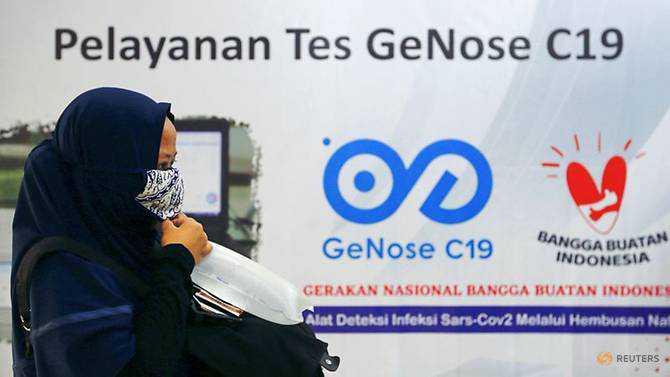Indonesia deploys COVID-19 breath check detectors at train stations
04 February, 2021

Indonesia on Wednesday (Feb 3) rolled out COVID-19 breath check detectors at coach stations.
The detectors, known as GeNose, originated by the University of Gadjah Mada (UGM), which says it detects the reaction between the coronavirus and body tissue in the respiratory system with at least 95 % accuracy.
Subjects must blow into a handbag and the result comes in just two minutes.
A similar breath test for COVID-19, SpiroNose, produced by a Dutch health technology enterprise, has been rolled out in holland to increase its testing process.
GeNose underwent scientific trial at a Yogyakarta hospital in May 2020 and was approved for distribution in December. It differs from the polymerase chain reaction (PCR) swab tests and the rapid tests that extract blood with a prick of the finger.
A guy wearing a protective mask gives a plastic handbag containing his air sample to be tested using GeNose, a COVID-19 detection tool, at a place in Jakarta, Indonesia on Feb 3, 2021. (Photo: Reuters/Ajeng Dinar Ulfiana)
"It's a simple method and easier for me as sometimes, the quick antigen test hurts a little bit," said Mugi Hartoyo, 59, after taking the check in central Jakarta.
Indonesia gets the biggest coronavirus battle found in Southeast Asia, with about 1.1 million infections and a lot more than 30,000 deaths, stretching its hospitals. Critics have explained its testing, tracing and overall health protocols have already been weak.
The device, sold at 68 million rupiah (US$4,850), is implanted with a memory of positive PCR swab test outcomes, Kuwat Triyana, who heads the innovation team, told Reuters.
"This device adapts the function of the human being nose or of the sniffer dog's nose, which is to discover the smell, or in this case to recognise the smell of the breath of someone who is confirmed with COVID, in comparison to people who are not," he said.
People that have positive readings must undergo a confirmatory PCR evaluation.
Though it does have shortcomings, it might help detection efforts, said Dicky Budiman, an epidemiologist at Griffith University.
"On paper it's promising and possesses potential, I'd say. However the implementation is comparatively not easy," he explained, adding the machine would have to be programmed with precise data to ensure accuracy.
Source:
TAG(s):
